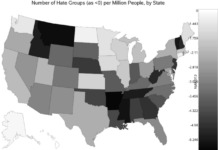We could compile an extensive list of how many people’s blood the United States has had on its hands throughout its short 242-year history.
But we’ve also been known to do the right thing from time to time.
We made history on Thursday when the United States Senate chose peace over war when it voted 56-41 to cease its involvement in another foreign conflict blighting its reputation on the world stage, the first time the Senate approved such a resolution under the War Powers Act.
The United States’ participation in the Saudi Arabia-led intervention in the Syrian civil war has implicated itself in the starvation of 14 million people who have been suffering since the Yemen war escalated in 2015.
The brutal death of Saudi journalist and American resident Jamal Khashoggi, who was brutally tortured and murdered in the Saudi consulate in Istanbul, Turkey on October 2, also played a decisive hand in the Senate’s vote.
Text of the Senate’s resolution reads, in part:
“Whereas the ongoing civil war in Yemen has exacerbated that country’s humanitarian crisis, in which nearly 12,000,000 people are suffering from “severe hunger,” according to the United Nations’ World Food Programme…
“Whereas the Government of the Kingdom of Saudi Arabia has, in recent years, engaged in concerning behavior, including its conduct in the civil war in Yemen, apparent detention of the Prime Minister of Lebanon, undermining the unity of the Gulf Cooperation Council, expulsion of the Canadian ambassador, suppression of dissent within the Kingdom, and the murder of Jamal Khashoggi…
“Whereas misleading statements by the Government of the Kingdom of Saudi Arabia regarding the murder of Jamal Khashoggi have undermined trust and confidence in the longstanding friendship between the United States and the Kingdom of Saudi Arabia…
“Whereas such erratic actions place unnecessary strain on the United States-Saudi Arabia relationship, which is an essential element of regional stability.”
After the historic vote, Sen. Bernie Sanders (I-Vt.), the measure’s co-sponsor with Sen. Mike Lee (R-Utah), stated during a press conference:
“This is about 85,000 children starving to death; 10,000 new cases of cholera every single week; and the United Nations telling us that Yemen is on the verge of imminent famine, with the possibility of millions of people dying all because of Saudi activities in that civil war. And I think the historical importance of today is not only moving the United States out of that horrific war, but is having the country see that their elected representatives are about to take back their constitutional responsibility on the issues of war; one of the most important functions that the United States Congress has.”
According to Truthout:
“Negotiators from both sides of the conflict agreed to a ceasefire around the Red Sea port of Hodeida, which is crucial for delivering food and aid, and an exchange of more than 15,000 war prisoners by January 20, according to reports.”
Some argue, though, the Senate’s vote may be insufficient since the withdrawal does not take immediate effect. In response, activists are urging Democrats to act quickly on it when they assume the House majority in three weeks.
That concern is not unfounded since outgoing House Speaker Paul Ryan (R-WI) and the House Rules Committee blocked a parallel resolution the day before the Senate motion, delaying until next year meaningful revisions to U.S. policy.
Even if more needs to be done, others contend the Senate at least acted decisively, setting a tone blatantly opposed to that which the Trump administration has created in its cozy relationship with the Kingdom of Saudi Arabia.
Hassan El-Tayyab, a co-director of Just Foreign Policy, stated the Senate vote is “absolutely” having an effect on peace talks.
He said:
“The pressure we are putting on Congress, and as a result, the pressure Congress is putting on Saudi Arabia, is a huge piece of leverage for the UN Special Envoy Martin Griffiths to use when he sits down with Hadi and the Houthis in Sweden.”
Sen. Sanders added:
“The War Powers Act was passed 45 years ago. Today, for the first time, we are going to go forward utilizing that legislation, and tell the president of the United States that the constitutional responsibility for making war rests with the United States Congress, not the White House. I hope…we send a loud and powerful message by passing this resolution. That we’re going to bring peace to that country and that the United States Congress is going to reassert its constitutional authority to be the body that makes war, not the president.”
Image credit: Times of Israel





